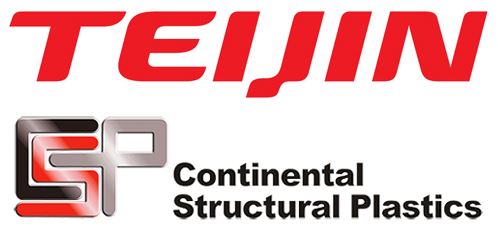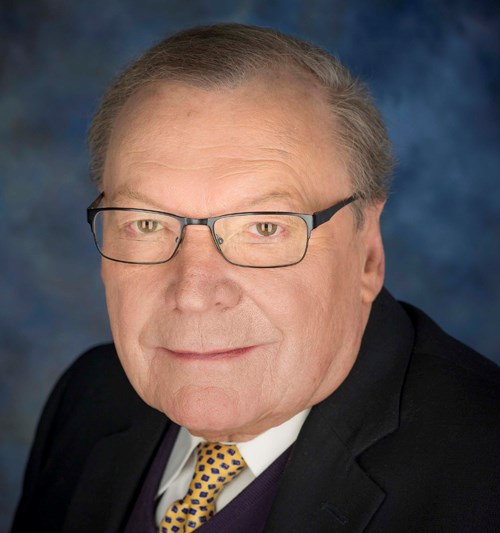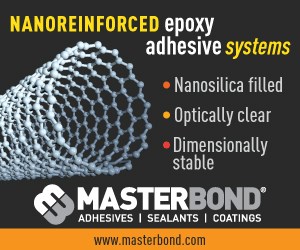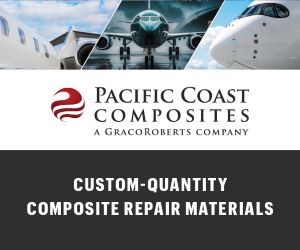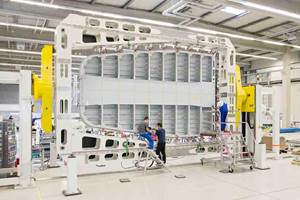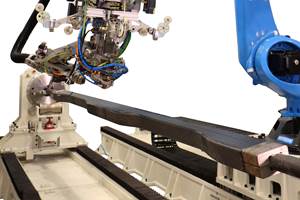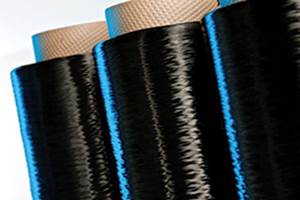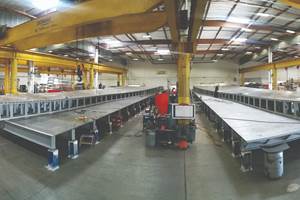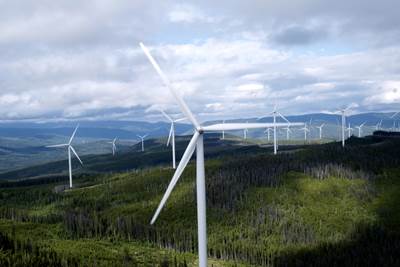Teijin + Continental Structural Plastics: Going forward
With Teijin set to take the reins of Continental Structural Plastics (CSP), both companies start thinking about how the future will look for this new autocomposites Tier 1.
Frank Macher, CEO and chairman of Continental Structural Plastics (CSP, Auburn Hills, MI, US), told CompositesWorld on Oct. 19 that transition activities have begun in the wake of Teijin Ltd.’s (Osaka, Japan) Sept. 13 announcement that it plans to acquire CSP.
Going forward, says Macher, CSP will be operated as a wholly owned subsidiary of Teijin. Further, the entire CSP management team has been asked to remain on board, the CSP name and brand will be retained by Teijin, and all CSP facilities in North America, Europe and Asia are expected to be maintained, if not expanded.
Macher says the decision to retain the CSP name was a strategic one by Teijin, based on CSP’s well-established position and high profile in the autocomposites industry. In a statement to CW, however, Teijin Advanced Composites America vice president Eric Haiss said, “At the moment, we are planning to keep the CSP name, but an official decision will be made in the near future.”
For his part, Macher, who is 75, says he has “retired” from five jobs and sees his CSP role as the last of his career. He expects to remain at the CSP helm to help guide transition activities, and then hopes to move into a part-time advisory role.
Until then, there is a fair amount of transitioning to do, given the complimentary nature of the two companies. CSP’s specialization in glass fiber/thermoset resin-based composites manufacturing — especially sheet molding compound (SMC) — for automotive, transportation and industrial applications contrasts nicely with Teijin’s thermoplastics, carbon fiber and aramid fiber products.
As a result, says Macher, expect to see CSP expand its composite materials portfolio to include combinations of glass, carbon, aramid, thermoset and thermoplastic systems. And don’t be surprised, he says, to see thermoplastic/thermoset overmolding combinations, especially for automotive applications.
Also coming to CSP from Teijin’s Toho Tenax unit will be the Sereebo and PvP (Part via Preform) material/process systems. Sereebo integrates nylon and chopped carbon fiber in a compression molding process to produce parts that are expected to have utility in structural and semi-structural applications. PvP uses Toho Tenax TENAX Binder Yarn to quickly fabricate carbon fiber preforms. The yarn can be processes via random fiber placement for isotropic behavior, or via aligned unidirection fiber placement.
Reiterating this, Teijin's Haiss says, “We hope CSP can utilize Teijin's existing composite technologies such as Sereebo and PvP, to capture a broader market share in CFRP applications. In the future, we believe it will be necesary to develop mixed or hybrid materials which use a variety of fibers and resins to make the most cost effective solution for the customer. This will be a key focus for us going forward.”
Looking at the acquisition more broadly, Macher believes CSP and Teijin is a marriage that has a bright future in autocomposites. In particular, he sees CSP’s position as a manufacturer of battery trays for electric drivetrains as especially promising. Automotive OEMs, he notes, are signaling that many of their models will, eventually, be available in an all-electric version. “We are seeing significant growth in that type of vehicle across the world,” he says, adding that “there has to be aggressive application of new technologies and materials to meet fuel efficiency requirements.”
In addition, the company’s Ultra Lite SMC product is proving highly competitive with aluminum and steel in body panels and semi-structural parts. The award-winning SMC in-bed storage box for the Honda Ridgeline pickup truck is exhibit number one of this material. Along these lines, Macher says a carbon fiber SMC has been developed by CSP and will be commercialized soon.
Asked about CSP’s end-market mix, Macher says to expect a transition there as well. Currently, about 37% of CSP’s business in non-automotive markets, “which is fairly high,” he says. Non-automotive business is not expected to decrease in whole numbers, but given the growth of automotive, it will shrink relatively. “We hope, within five years, to have 80% of our business in automotive,” he says.
Finally, there is in the Teijin/CSP deal a certain amount of signaling to the automotive and composites industries about the seriousness of Teijin’s intentions in this space. “I think,” says Macher, “this deal shows that composites will work in automotive and that there are strategic partners who will invest.” As to the “fit” of the two companies, Macher is clear: “Their [Teijin’s] philosophy is the same as ours. We want to be a full-service supplier that develops the material and provides manufacturing solutions. We want to be fully integrated.”
On this topic, Haiss says, “CSP has a firmly established position in lightweight automotive components field and Teijin has high-performance material technologies such as carbon fiber, aramid fiber and high-performance resins, and a global network (especially in Europe and Asia). We believe the integration of CSP and Teijin establishes a truly global solutions provider for lighweight composites.”
In question now is how CSP will interact with non-Toho Tenax suppliers of carbon fiber. In March 2016, CSP and Mitsubishi Rayon Co. Ltd. (MRC, Tokyo, Japan) announced a memorandum of understanding (MOU) to develop compression molding processes for carbon fiber autocomposites. Macher says that MOU has been dissolved in the wake of the Teijin acquisition, but he did express hope that the work done with MRC’s 50K tow carbon fiber might still be pursued in some fashion.
Teijin's Haiss reiterated this, saying, “Although CSP will certainly have access to Toho Tenax carbon fibers, we don't intend to restrict or limit their usage of other competing fibers. Ultimately, we must provide the customer with the most cost-effective, high-performance product possible, and it may require fibers which Teijin does not produce. We want CSP to continue to search for stable and cost effective sources for carbon fibers and other materials, just as they always have done.
Regarding the decision to sell CSP, Macher notes that the company was acquired by Richard L. Scott Investments LLC (RLSI) in 2006, which managed the business until 2010, when Rick Scott, who owns RLSI, was elected governor of Florida. Scott transferred CSP to a trustee and left day-to-day operation of the company to a management team. The management team, says Macher, seeing strong revenue and growth fueled by autocomposites, decided it was time to sell and began seeking strategic investors earlier this year. Most CSP suitors, says Macher, came from the chemical industry, although he declined to say who they were. Teijin’s acquisition of CSP is expected to be finalized before the end of 2016.
Related Content
From the CW Archives: Airbus A400M cargo door
The inaugural CW From the Archives revisits Sara Black’s 2007 story on out-of-autoclave infusion used to fabricate the massive composite upper cargo door for the Airbus A400M military airlifter.
Read MoreMFFD thermoplastic floor beams — OOA consolidation for next-gen TPC aerostructures
GKN Fokker and Mikrosam develop AFP for the Multifunctional Fuselage Demonstrator’s floor beams and OOA consolidation of 6-meter spars for TPC rudders, elevators and tails.
Read MoreMaterials & Processes: Fibers for composites
The structural properties of composite materials are derived primarily from the fiber reinforcement. Fiber types, their manufacture, their uses and the end-market applications in which they find most use are described.
Read MoreMaterials & Processes: Tooling for composites
Composite parts are formed in molds, also known as tools. Tools can be made from virtually any material. The material type, shape and complexity depend upon the part and length of production run. Here's a short summary of the issues involved in electing and making tools.
Read MoreRead Next
From the CW Archives: The tale of the thermoplastic cryotank
In 2006, guest columnist Bob Hartunian related the story of his efforts two decades prior, while at McDonnell Douglas, to develop a thermoplastic composite crytank for hydrogen storage. He learned a lot of lessons.
Read MoreCW’s 2024 Top Shops survey offers new approach to benchmarking
Respondents that complete the survey by April 30, 2024, have the chance to be recognized as an honoree.
Read MoreComposites end markets: Energy (2024)
Composites are used widely in oil/gas, wind and other renewable energy applications. Despite market challenges, growth potential and innovation for composites continue.
Read More

